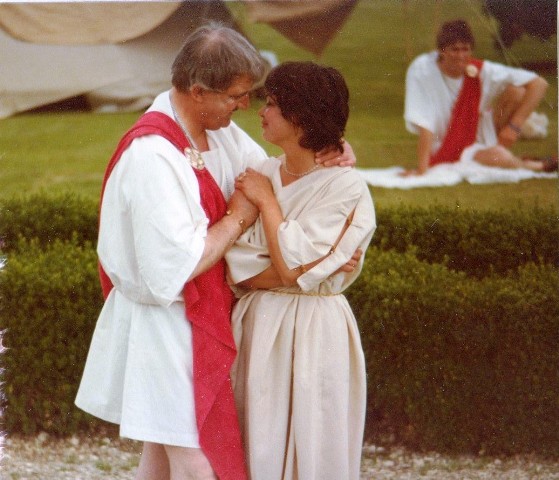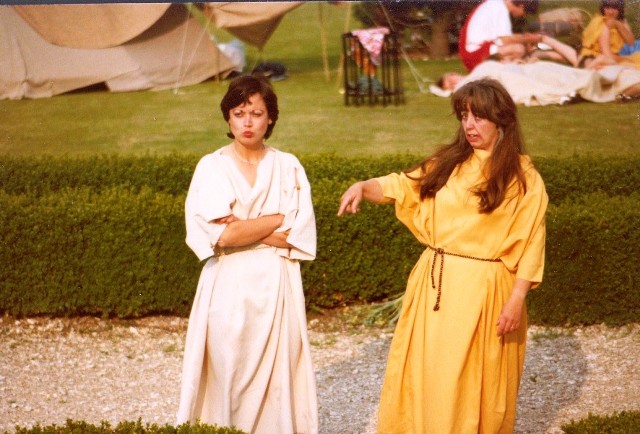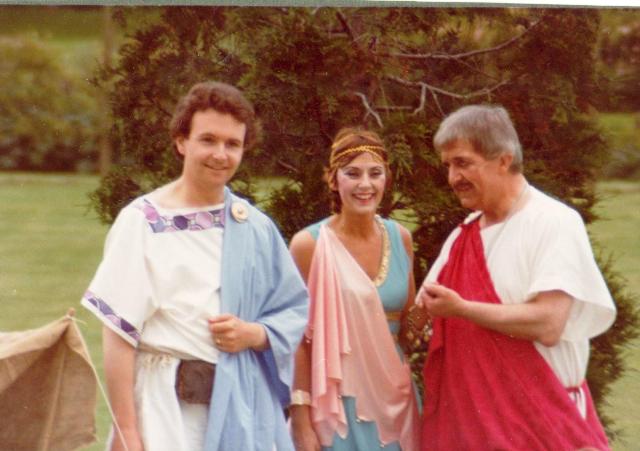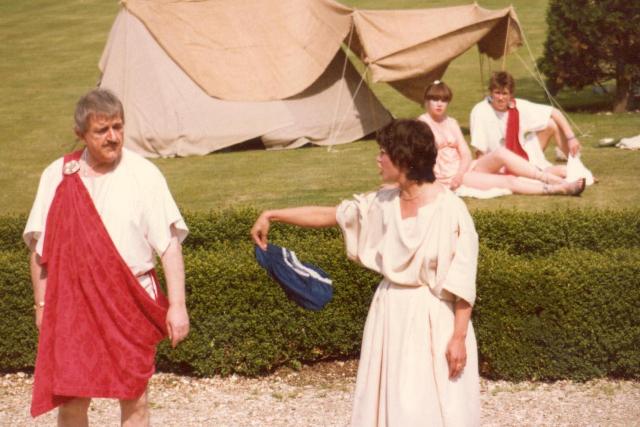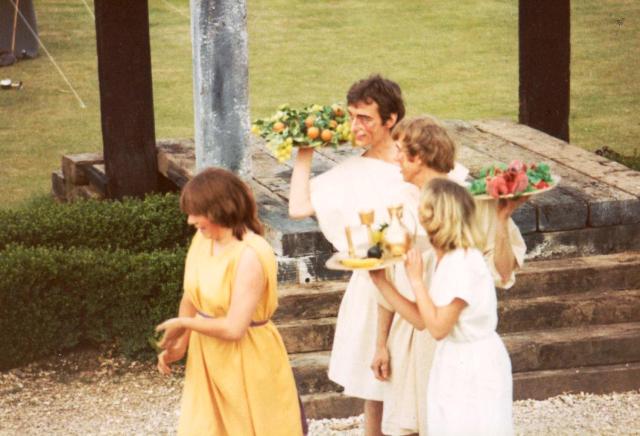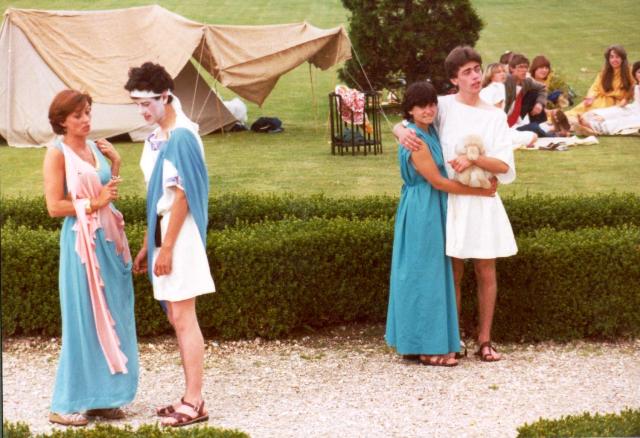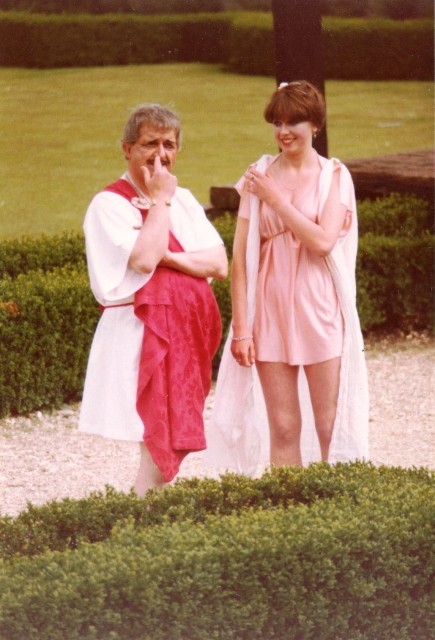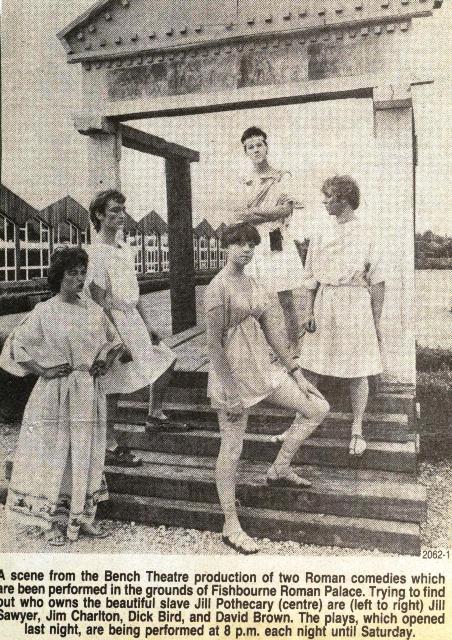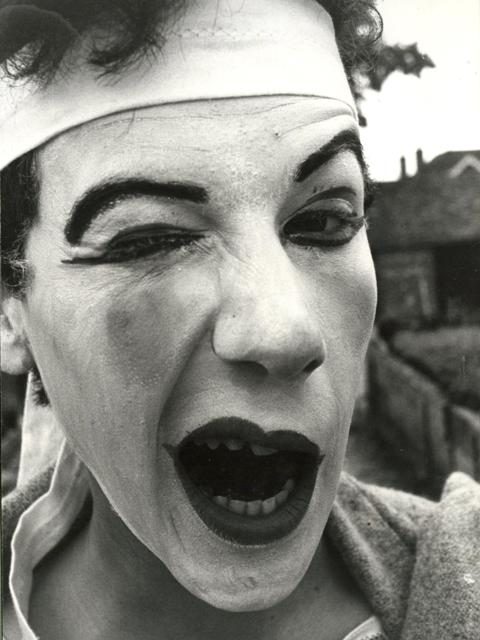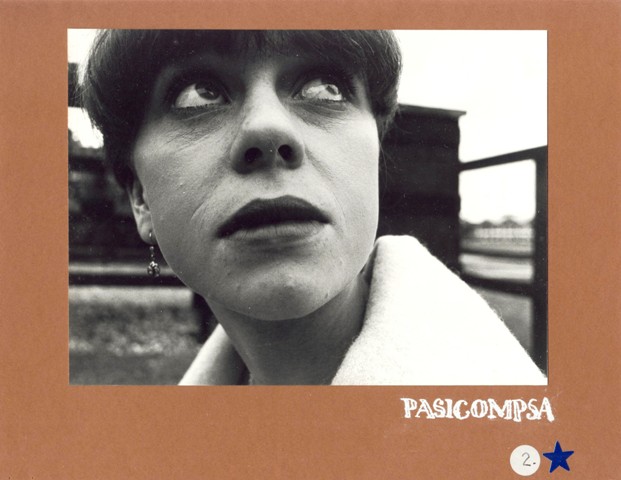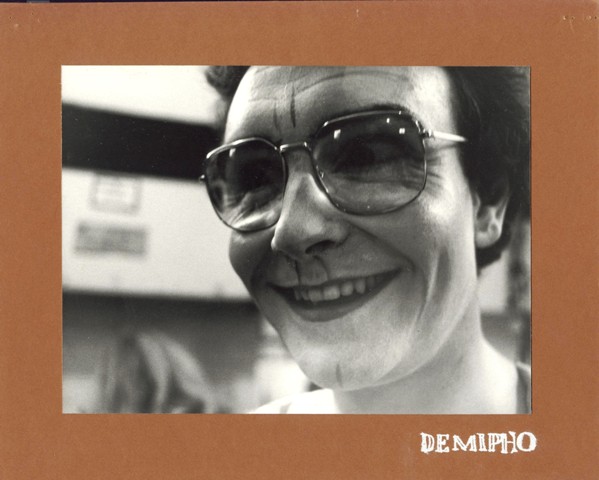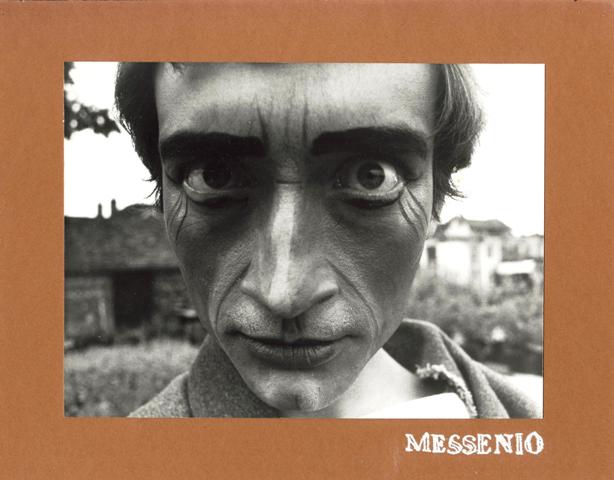The Bench Production
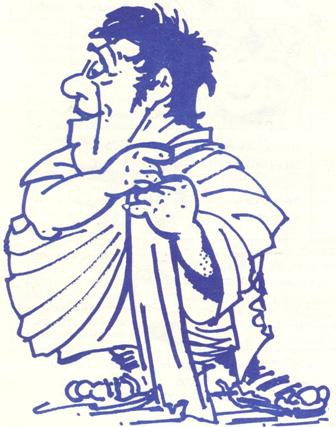
These plays were first staged for five performances, in the open air, at the historic site of Fishbourne Roman Palace. They were later staged for a further four performances at Havant Arts Centre, East Street Havant - Bench Theatre's home since 1977.
Characters - The Merchant
| Demipho | David Penrose |
| Lysimachus | Ray Osborne |
| Charinus | Dik Bird |
| Acanthio | Keith Woodason |
| Lycissa | Ellie Constad |
| Dorippa | Jill Sawyer |
| Pasicompsa | Jill Pothecary |
| Cylindrus | Lezley Picton |
| Eutychus | Chris Shaw |
| Syra | Janet Simpson |
| Peristrata | Ruth Prior |
| Servant | Jim Charlton |
| Scullion | David Brown |
| Scullion | Diane Lloyd |
Characters - The Brothers
| Old Father | David Penrose |
| Peniculus | Ray Osborne |
| Doctor | Dik Bird |
| Sosicles | Keith Woodason |
| Maid | Ellie Constad |
| Erotium | Jill Sawyer |
| Wife | Jill Pothecary |
| Cylindrus | Lezley Picton |
| Menaechmus | Chris Shaw |
| Messinio | Jim Charlton |
| Prologue | David Brown |
| Cuddles | Diane Lloyd |
| Woman | Janet Simpson |
| Woman | Ruth Prior |
Crew
| Director | David Penrose |
| Stage Manager | Jacquie Penrose |
| Assistant Stage Managers | Rod James Amanda Payne Janice Clausen |
| Lighting | Terry Cattermole |
| Electrician | Tony Terribile |
| Costumes | Lynda James Janice Lloyd |
| Set | John Wright Peter Bain |
Programme Notes
Ray Osborne
Ray is a founder member of the Bench and last year he took part in the 10th Anniversary production of 'The Love of Four Colonels' by Peter Ustinov, which has also been the Bench's first production in 1969. He claims an interest in the occult and hopes one day to be an actor.
David Penrose
Since 1976, David has been involved in many plays with the Bench, including 'A Day in the Death of Joe Egg', 'The Philanthropist', 'Private Lives' and 'Waiting for Godot', in which he played Estragon. He was partly responsible for planning and organising the trip to the Edinburgh Festival. In his spare time he also directs plays at Havant College, such as 'Marat-Sade' by Peter Weiss, and 'The Real Inspector Hound'. He does not yet speak Latin fluently.
Dik Bird
A new member of the Bench, but he has done a number of productions at Havant College, where he is still a student, notably playing Michael in 'The Golden Pathway Annual'. He gets violent if called Dickie.
Keith Woodason
This is Keith's 3rd production for the Bench. He played an extraordinary number of parts in 'Twelfth Night' last year and was also in Shaw's 'Pygmalion'. He is showing recent signs of temperament as a result of giving up smoking.
Ellie Constad
Ellie runs a Honda 50 (low mileage, taxed) and played Clara in 'Pygmalion'. This is her second production for the Bench. If she sells the Honda, it may be her last.
Jill Sawyer
Jill is reasonably sure that it was 1974 when she joined the Bench. Last year, she ran the risk of typecasting when she played several tarty ladies in a row; in 'The Love of Four Colonels', in 'The Birthday Party' and now in the present production. But she has also played puck in 'A Midsummer Night's Dream' Viola in 'Twelfth Night', as well as directing. She does have a phone number.
Jill Pothecary
Jill is another new Bench member, but a relatively old Havant College one. She was in 'The Golden Pathway Annual' and her immediate and modest ambition is a holiday to France.
Lezley Picton
This is Lezley's first Bench production but she has achieved some notoriety doing bass guitar for Rox and Rawdeal. She played in the band for The Golden Pathway Annual'. She has been known to sing real music too.
Chris Shaw
Actor, writer and director extraordinaire. His involvement with the Bench also includes photography and the designing of posters. He gave a memorable performance as Don in 'The Philanthropist' by Christopher Hampton.
Janet Simpson
Janet says she is a struggling actress and budding grandmother, or vice-versa. She has been a fully active member of the Bench; recently she played Meg in 'The Birthday Party'.
Ruth Prior
Despite appearances, Ruth has only acted in two Bench productions, 'The love of Four Colonels' and 'Pygmalion'. She is also renowned for her excellent coffee.
Jim Charlton
Jim played Stan in 'The Birthday Party' and has made himself indispensable as a stage manager. He has no interesting hobbies and refused to invent any.
David Brown
David has moved from Havant College productions to Bench ones. He makes a great scene-changer but he played Feste in 'Twelfth Night'. In his earlier college days he played the Marquis de Sade in 'Marat-Sade'.
Diane Lloyd
A new Bench member who joined to do props for 'Pygmalion'. She is not the least bit ashamed of being new, nor of her passion for gardening.
Jacquie Penrose
Jacquie joined the Bench in 1976. She acted with a Hoover in 'Habeas Corpus' by Alan Bennett, and fleetingly in 'Ways and Means' by Noel Coward. On the whole she prefers the relative safety of backstage, from where she directed 'Private Lives' by Noel Coward and 'Twelfth Night'.
Janice Clausen
Janice used to be a librarian and will shortly be training as a teacher. She used to sing for the Havant Choral Society and among her other skills she lists being able to milk a cow - she does live on a farm!
Lynda James
Lynda is bravely doing costumes for the second time; her first excellent undertaking being for 'Twelfth Night'. She has also taken on in the past the thankless task of handling ticket sales, and somehow survives being married to a sociology teacher.
Rod James
Rod is really a sociology teacher but ventured out to play Orsino in 'Twelfth Night'. For this production, having double-booked himself over dates, he decided to work backstage.
Amanda Payne
Amanda joined the Bench as one of the crowd in 'Pygmalion'. Otherwise she works for Plessey and claims to divide her time at the moment between the Bench, the pub and needlework.
Tony Terribile
Tony used to work professionally for the Overground Theatre, Kingston. He has been with the Bench about eighteen months, during which time he has worked backstage on 'A Midsummer Night's Dream' and 'Habeas Corpus'.
Terry Cattermole
One could say that Terry is one of the mainstays of the Bench. His most recent performance was as Henry Higgins in 'Pygmalion', while at Christmas he terrified audiences with his villain in the Music Hall. He has now taken on the quieter role of lighting man.
John Wright
John is a teacher at Havant College; before that, in Durham, he staged managed for the Phoenix Players. He has been involved in stage design throughout his teaching career, and has created some incredible decorative schemes for the annual Havant College Ball.
Peter Bain
Peter is Head of Art at Havant College. He is also a professional artist, and has long been involved in stage designing.
Tim Mahoney
During the rehearsal of this production, Tim Mahoney, who was to have played Demipho in The Merchant, died suddenly after a heart attack. Not only does his death man a considerable loss to this production but as a founder member of the Bench and a great to its members he will always be remembered with great fondness.
Reviews
The News F.W.
Roman romps out in open
When in Rome, do as the Romans do... and last night in Fishbourne we did just that. We sat in the formal gardens of the largest Roman residence discovered in Britain and watched two comedies from the pen of a playwright who lives around 254 B.C. It was a double first. The first time Roman comedies have been performed in a Roman palace in Britain and also the first time the Bench Theatre, of Havant has stepped into the great outdoors to show its acting talents. The combination was a great evening's entertainment, which was the climax of a join enterprise between Mr David Rudkin, the young enthusiastic director of the Roman Palace, and the Bench Theatre team.
Two Plautus comedies, 'The Brothers', and 'The Merchant', have been adapted from translations to bring broad smiles and laughter from a responsive audience. A great team of actors took us back hundreds of years to perform a couple of frolicking tales - and the amazing thing was that the comedy was as fresh as if it had been written last night. The jokes could have come from this week's Punch, which either goes to show that man has not made much progress as far as humour is concerned, or that old jokes are the best ones. Each character mastered his role splendidly. But special mention must be made of young Dik Bird, who played the love-lorn son outbidding his father for the affections of a lusty young slave.
David Penrose and Ray Osborne, as the 'elder statesmen' of the cast, gave added zest and sparkle to witty lines and a great sense of timing brought well-deserved applause. The actors used the space and freedom of the Palace grounds to full advantage and hearty congratulations go to David Penrose who adapted and directed the plays. Mr Rudkin was delighted with the way outdoor theatre has "brought the Palace alive" and is hoping to stage similar events in the future. The plays continue until Saturday and will then move to the Havant Arts Centre, East Street, Havant from July 9 until July 12.
The News, 3rd July 1990
Letters to the Editor
Bench Marks
Congratulations to the Havant Bench Theatre and to the organizers of the production of the two Roman comedies (The Merchant and The Brothers) performed so well in the grounds of Fishbourne Roman Palace from July 1-8. Whoever had the idea of putting on the plays at the Palace deserves a pat on the back! Let's hope they do it again! After going to see the plays I can only say how entertaining the evening was. Despite the cold, the actors and actresses put on a performance of which to be proud.
The News, 3rd July 1990
